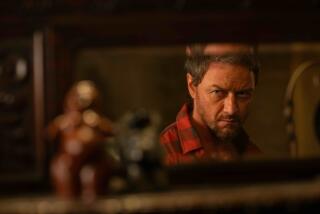Danish ‘Mifune’ Takes Witty, Brutal Look at Life
- Share via
Talk about bad timing. The hero of Soren Kragh-Jacobsen’s brutally funny “Mifune” has just married the daughter of his boss, a Copenhagen business tycoon, and given her an ecstatic bridal night when he receives a phone call that his own father, whose existence he has denied, has just died.
Anders W. Berthelsen’s Kresten has blotted out his past in his determination to make it to the top in Copenhagen. His mother’s life came to an inexplicably tragic end, and Kresten has been out of touch with his father for a decade. He knows he has no choice but to return to the family farm, for his father has been caring for his mentally impaired brother Rud (Jesper Asholt).
Leaving his perplexed bride (Sofie Grabel) with as brief an explanation as possible and the promise of a swift return, he takes off. Once he arrives at his birthplace you just know his life is about to unravel. The setting is idyllically beautiful, but the family’s handsome old manor stands dilapidated. Kresten will soon discover that the interior is a veritable pig sty--and that his father in his decline after his wife’s death simply let all his livestock die. Kresten’s past has caught up with him with a vengeance.
Meanwhile, we cut to a young Copenhagen call girl, Liva (Iben Hjejle), who’s reached the end of her rope. On the one hand she’s tormented constantly by an obscene phone caller and on the other she’s outraged at discovering that one of her clients is the same man who viciously caned her young brother Bjarke (Emil Tarding) in the private school, the school she pays for by being a prostitute. In short, she’s in the perfect mood to respond to an ad seeking a housekeeper at a farm.
The moment you see Kresten, a tall, strapping fellow, and Liva, whose loveliness cannot be hidden by her current stress, together you realize they make a most attractive, well-matched couple. They are both strong, resilient individuals with a good sense of humor, and Liva is instinctively kind and patient with the childlike, easily frightened Rud, who confuses her with the heroine in a favorite comic strip. When the troubled--and troublesome--Bjarke joins the group we see the outlines of a family forming, with Kresten and Liva responding to living close to nature--and, gradually, each other as well.
*
The obstacles to any such love and happiness, however, are constant, calamitous and at times downright savage. Yet in his no-holds-barred manner Kragh-Jacobsen is able to see the humor--as knockabout, bleak and corrosive as it can be--in Kresten and Liva’s ever-shifting predicament. A hard-edged urban ruthlessness in both of them begins to fade in the countryside, and in no time Kresten and Liva engage our sympathy and concern.
“Mifune” does in fact take its title from the late, great Toshiro Mifune, a screen hero revered by Kresten and Rud, who identifies his brother with the Japanese actor, from the time they fell under the spell of “Seven Samurai” as youngsters.
Lars von Trier and Thomas Vinterberg asked Kragh-Jacobsen to make the third Dogma 95 film, and “Mifune” is the result, which means that among other conditions it had to be shot with a hand-held camera without artificial lighting; Anthony Dod Mantle, who photographed “The Celebration” for Vinterberg, again does the honors. Kragh-Jacobsen certainly puts his actors through their paces in demanding fashion but they come through, as does the equally demanding “Mifune,” a pow-in-the-kisser kind of movie.
* MPAA rating: R, for strong sexuality and language, and for some violence. Times guidelines: language, sex and considerable brutality, even allowing for an overall humorous context.
‘Mifune’
Anders W. Berthelsen: Kresten
Iben Hjejle: Liva
Jesper Asholt: Rud
Emil Tarding: Bjarke
A Sony Pictures Classics release produced by Nimbus Films in cooperation with Zentropa Entertainments. DRTV and SVT Drama, with support from the Nordic Film and TV Fund and the Danish Film Institute. Director Soren Kragh-Jacobsen. Producer Birgitte Hald. Screenplay Kragh-Jacobsen, Anders Thomas Jensen; from a story by Kragh-Jacobsen. Camera Anthony Dod Mantle. Editor Valdis Oskarsdottir. Music Nulle Og Verdensorkestret. In Danish, with English subtitles. Running time: 1 hour, 40 minutes.
Exclusively at the Music Hall, 9036 Wilshire Blvd., Beverly Hills, (310) 274-6869, and the Monica 4-Plex, 1332 2nd St., Santa Monica, (310) 394-9741.


